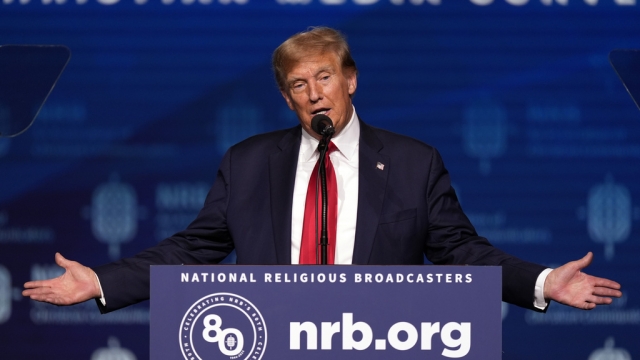Attorneys for former President Donald Trump filed documents late Thursday to have a federal court case thrown out, citing presidential immunity.
The filing was made in a case involving Trump's possession of classified and top-secret documents at his Mar-a-Lago residence in Florida. It's an argument similar to one being made in the case surrounding Trump's involvement in attempting to overturn the results of the 2020 presidential election.
Trump has argued that he cannot be tried for alleged crimes that took place while conducting official presidential acts. However, his argument has not held up in court.
A three-judge panel with the U.S. Court of Appeals in the District of Columbia ruled earlier this month that "any executive immunity that may have protected him while he served as President no longer protects him against this prosecution." A lower court also ruled that Trump is not immune from prosecution.
Trump has appealed the decisions to the Supreme Court, which has not yet ruled.
SEE MORE: Trump overwhelming favorite going into South Carolina primary
The latest motion calls for the dismissal of counts relating to retaining and failing to deliver national defense documents under the Espionage Act. In total, Trump faces 40 criminal counts involving holding confidential documents at Mar-a-Lago.
"President Trump is immune from prosecution on Counts 1 through 32 because the charges turn on his alleged decision to designate records as personal under the Presidential Records Act (“PRA”) and to cause the records to be moved from the White House to Mar-a-Lago," his attorneys wrote in a court filing. "As alleged in the Superseding Indictment, President Trump made this decision while he was still in office. The alleged decision was an official act, and as such is subject to presidential immunity."
Trump has not denied possessing such documents, but has claimed that the documents were not classified when he was in possession of them.
Trump was notified that presidential records, such as a letter addressed to Trump from North Korean leader Kim Jong-un, were missing. The National Archives and Records Administration said it requested documents pursuant to the Presidential Records Act in May 2021. The DOJ said that the National Archives made "repeated" requests for records from May through December 2021.
The confidential documents case is one of four criminal cases Trump faces heading into the 2024 election.
Trending stories at Scrippsnews.com




